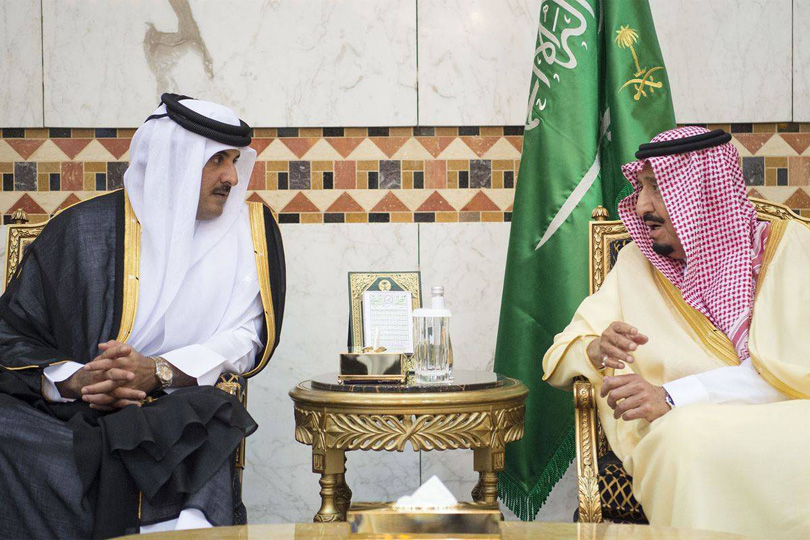JAMES JEFFREY AND SIMON HENDERSON
The crisis between an Arab coalition led by Saudi Arabia and the United Arab Emirates on one side, and fellow Gulf Cooperation Council member Qatar on the other, shows no signs of abating. Qatar has responded to the list of 13 demands presented to Doha last month. At a meeting in Cairo on July 5, Egypt, Saudi Arabia, Bahrain and the UAE said they regretted Qatar’s “negative” response to their list of demands, and restrictions they had imposed would continue.
The origins of the tensions stretch back decades – probably generations in the minds of the main characters – but it is unclear why they suddenly erupted in May with the breaking of diplomatic relations and the cutting of air, sea, and land links. The alleged cause – that Emir Tamim bin Hamad al-Thani of Qatar made pro-Iranian remarks – is fiercely contested. With hindsight, both sides seem to have been preparing for such a schism for months.
In Africa or Southeast Asia, such an apparently trivial, almost adolescent row between neighbors would have perhaps little consequence, but in the Persian Gulf it is a different matter. Saudi Arabia is the world’s largest oil exporter, and Qatar is the world’s largest exporter of liquefied natural gas (LNG). All the direct parties to the dispute are allies of Washington. Less friendly countries, most obviously Russia and Iran, are on the sidelines, ready to profit from the crisis.
If neither the Saudis and Emiratis, nor the Qataris back down, and the United States continues to vacillate between the president’s tilt towards Riyadh and his senior officials’ concerns with Saudi action and thus not find a way to mediate this crisis to a compromise stand-down, it could metastasize. The Saudis and Emirates, as reported, could attempt a secondary boycott of states trading with Qatar, and or ratchet up military pressure by threats of a naval blockade or border mobilization. Direct military action may have been considered until Turkey sent troops to Qatar for a previously planned exercise, Middle East analyst Theodore Karasik reported July 2. And as Foreign Policy noted last week, the Qatari foreign minister spoke of his country's legal recourse against what he termed an "illegal blockade."
Any further steps by the Saudis and Emiratis could thus generate a dramatic response by Qatar if it feels all paths to compromise are closed. The most obvious would be an appeal to the UN Security Council. This would automatically open the door for permanent member Russia to intervene directly in Gulf affairs two years after it did so successfully in Syria.
This would also put the U.S. on the spot. It could either block UN action, continue to vacillate, or seriously engage to resolve the crisis. If the last choice, a happy outcome is possible; otherwise, Qatar could play its diplomatic cards with powerful actors like Russia and Iran, who are not interested in buttressing an American-led regional security order. Less than happy memories of the Ottoman presence a century ago have dulled in Doha. Now Turkey is a useful partner, and Ankara is exasperated by the Saudi-Emirati call for the Turkish base in Qatar to be closed.
An even more dangerous course would be for Qatar to play its military cards. It could start with the U.S., which has security cooperation agreements with Qatar dating from 1992 and 2013 on whose basis the U.S. uses the al-Udeid Airbase as a vital regional strike and command/control center. Such agreements have either explicitly or implicitly stated that a host country can "call" on the U.S. to assist if the host faces a security threat. While vague and not legally binding, such commitments (i.e. in the U.S. Iraqi Strategic Framework Agreement) are called due in emergencies, such as the ISIS assault on Iraq in 2014.
While U.S. policy in this crisis has been opaque, it almost certainly would not side with Qatar. But that could then prompt Qatar to restrict U.S. use of al-Udeid, right at the point where operations against ISIS controlled by, and in some cases flown out of there, are at a critical point. Even more serious, if Qatar feels cornered and unable to receive succor from the UN or U.S., it could turn to Russia and or Iran to provide military support, fully within Qatar's sovereign rights to request and theirs to grant. The idea that the U.S. would try to stop such action militarily is absurd, even though this would put Russian forces in the Gulf, and Iranian ones close to Shia populations in Bahrain, Kuwait, and eastern Saudi Arabia.
The Saudis and Emiratis have experienced diplomats and could likely foresee such an eventuality, yet they went ahead anyway with their boycott of Qatar. Perhaps this reflects the key roles taken by non-diplomats – the new Crown Prince Muhammad bin Salman (MbS) in Saudi Arabia, whose ascension was a sidebar in the crisis; the ambitious Crown Prince Muhammad bin Zayed (MbZ) in the UAE capital, Abu Dhabi; and the Emir/Father-Emir combination in Doha, where Tamim’s father is a lingering presence.
Perhaps MbS and MbZ thought the Qataris would back down, but also, perhaps they thought the Trump Administration would provide a diplomatic and military shield against any outside support for Qatar. If so, this could well be a mistake. Apart from understandable U.S. concerns with the manner and motives of the Saudi-Emirati initiative, and its military equities at al-Udeid Airbase, the U.S. is restrained, as in Syria, by a longstanding reluctance to intervene directly inside a nation-state in opposition to its government.
Even if such a dire scenario does not come to pass, its possibility alone illustrates the perilous point the region has reached with this crisis.







Comments